|
|
|
Sort Order |
|
|
|
Items / Page
|
|
|
|
|
|
|
| Srl | Item |
| 1 |
ID:
117206


|
|
|
|
|
| Publication |
2012.
|
| Summary/Abstract |
While the recent interest in affects and emotions in world politics is encouraging, the crucial relationships between affect, emotion, and discourse have remained largely under-examined. This article offers a framework for understanding the relations between affect and discourse by drawing upon the theories of Jacques Lacan. Lacan conceptualises affect as an experience which lies beyond the realm of discourse, yet nevertheless has an effect upon discourse. Emotion results when affects are articulated within discourse as recognisable signifiers. In addition, Lacanian theory conceptualises affect and discourse as overlapping yet not as coextensive, allowing analyses to theoretically distinguish between discourses which become sites of affective investment for audiences and those that do not. Thus, analysing the mutual infusion of affect and discourse can shed light on why some discourses are more politically efficacious than others. The empirical import of these ideas is offered in an analysis of American affective reactions to 11 September 2001.
|
|
|
|
|
|
|
|
|
|
|
|
|
|
|
|
| 2 |
ID:
117205
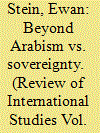

|
|
|
|
|
| Publication |
2012.
|
| Summary/Abstract |
This article critiques constructivist approaches to the international relations of the Middle East and sets out an alternative interpretation of the role of ideas based on political economy and the sociology of knowledge. It cautions against using constructivism as a way of 'building bridges' between IR and Middle East Studies and disputes the claim that the norms of 'Arabism' as a putative regional identity are in contradiction with those of sovereignty. The article shows that this assumption is based on the combined influences of modernisation theory and Orientalist assumptions about the power and continuity of regional culture that have persisted in Middle East IR. This is despite the fact that there is no reason to believe the Arabs constitute a more 'natural' nation than do the Syrians, Iraqis or Egyptians. The political role and resonance of ideas can be better established by viewing the modern history of the Middle East in terms of domestic structure and social change, and in particular emphasising the role of rising middle classes in revolutionary nationalist movements. The findings of this article raise questions for the utility of 'moderate' constructivist interpretations of International Relations as a whole.
|
|
|
|
|
|
|
|
|
|
|
|
|
|
|
|
| 3 |
ID:
117198
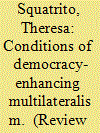

|
|
|
|
|
| Publication |
2012.
|
| Summary/Abstract |
As argued in a recent article by Keohane, Macedo, and Moravcsik, 'democracy-enhancing multilateralism' highlights the potential ways in which international organisations can enhance domestic democracy. The thesis raises an important question about the conditions which shape the likelihood that multilateralism will have such democratising effects. This article responds to the question of conditionality, looking at one way in which democracy may be improved by multilateralism-through the expansion of rights protections. That is, under what conditions will domestic democratic processes garner an improved ability to protect rights as a result of a state's participation in multilateral institutions? Using most likely empirical cases - the European Union (EU) and the Council of Europe (COE) - this article argues that three conditions affect the likelihood that rights expansion will result from multilateral legal institutions. Together the compatibility between the international legal principle and pre-existing domestic law, legal mobilisation, and the precision and obligation of the international law have significant affect on the likelihood of rights expansion. The unique contribution here is a set of conditions that helps to understand when and where rights are likely to expand as a result of a state's participation in international organisations.
|
|
|
|
|
|
|
|
|
|
|
|
|
|
|
|
| 4 |
ID:
117199
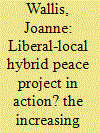

|
|
|
|
|
| Publication |
2012.
|
| Summary/Abstract |
The liberal peace project has dominated state-building operations since the end of the Cold War, including in Timor-Leste. However, the attempt to institutionalise the liberal peace faced significant challenges in Timor-Leste's fragmented subsistence-based society. This resulted in the creation of shallowly rooted and poorly-understood liberal state institutions that were disconnected from the majority of Timorese, who continued to follow their local sociopolitical practices. In response, the state has increasingly engaged with these local practices in order to create state institutions that make sense to the people they seek to govern. This engagement has occurred through the formalisation of local sociopolitical institutions, the recognition of local justice systems and the utilisation of local ceremonies and practices. Therefore, this article argues that a liberal-local hybrid peace project has emerged to guide state-building in Timor-Leste, which may indicate how similar projects could develop in the future.
|
|
|
|
|
|
|
|
|
|
|
|
|
|
|
|
| 5 |
ID:
117202
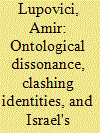

|
|
|
|
|
| Publication |
2012.
|
| Summary/Abstract |
This article further conceptualises and empirically tests the concept of ontological security. This concept, which refers to an actor's need to have a secure identity, has been used in International Relations (IR) mainly to study situations in which states face a threat to one of their identities. However, my focus here is on situations in which states are facing threats to a number of identities they hold, situations that result in what I term ontological dissonance. In such cases, not only are various distinct identities threatened, but the solutions to ease these threats are contradictory, forcing the state to choose between different cherished values. I contend that in such situations avoidance can become an attractive option for states in dealing with the difficulties arising from this dilemma. This theoretical framework is used to explain Israel's unilateral steps toward the Palestinians in recent years. I argue that the terror attacks of the Second Intifada (2000-2005) represented more than a physical security threat to Israel. The attacks and Israel's initial response to them aggravated threats to a number of Israel's identities and, more importantly, emphasised existing and potential future clashes among these identities. As a result, Israeli policy makers advanced unilateral steps to reduce these threats and to ease the accompanying ontological dissonance. These unilateral measures can thus be understood as measures of avoidance, and as such they complicated further cooperation between the Israelis and the Palestinians.
|
|
|
|
|
|
|
|
|
|
|
|
|
|
|
|
| 6 |
ID:
117197
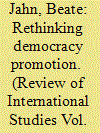

|
|
|
|
|
| Publication |
2012.
|
| Summary/Abstract |
Despite the fact that democracy promotion is a major part of liberal foreign policies, the discipline of International Relations has not paid much systematic attention to it. Conversely, the study of democracy promotion is dominated by comparative politics and pays hardly any attention to the international system. This mutual neglect signifies a core weakness in the theory and practice of democracy promotion: its failure to comprehend the development of liberal democracy as an international process. This article argues that a thorough engagement with John Locke explains the failures of democracy promotion policies and provides a more comprehensive understanding of the development of liberal democracy.
|
|
|
|
|
|
|
|
|
|
|
|
|
|
|
|
| 7 |
ID:
117204
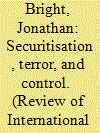

|
|
|
|
|
| Publication |
2012.
|
| Summary/Abstract |
Securitisations permit the breaking of rules: but which rules? This article argues that any given security situation could be handled by a variety of different 'rule breaking' procedures, and that securitisations themselves, whilst permitting rule breaking in general, do not necessarily specify in advance which rules in particular have to be broken. This begs the question: how do specific threats result in specific rule breaking measures? This article explores this question through reference to 'control orders', an unusual legal procedure developed in the UK during the course of the war on terrorism. Once applied to an individual, a control order gives the government a meticulous control over every aspect of their life, up to and including deciding on which educational qualifications they can take. Despite this control, individuals under the regime remain technically 'free': and have frequently used this freedom to abscond from the police who are supposed to be watching them. How did a security policy which controls a suspect's educational future, but not their physical movements, develop? This article aims to answer this question, and in so doing present a reevaluation of the mechanisms through which the effects of securitisation manifest themselves.
|
|
|
|
|
|
|
|
|
|
|
|
|
|
|
|
| 8 |
ID:
117203
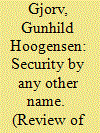

|
|
|
|
|
| Publication |
2012.
|
| Summary/Abstract |
This article examines the challenges and contradictions between some of the leading conceptions of security within the field of International Relations (IR), from those stating that the concept can only be employed by the state with regard to immediate, existential threats, to those that see security as the foundation of social life or as a human good. This article continues a discussion that has taken place in the Review of International Studies regarding the development of positive security, examining the potential use of the terms 'negative' and 'positive' security to bring clarity to these diverging security perspectives and to argue for a multi-actor security approach. It is argued that positive security perspectives, which rely on non-violent measures, ensure an emphasis upon context, values, and security practices that build trust, and by use of a multi-actor security model, shows the dynamics between state and non-state actors in the creation of security.
|
|
|
|
|
|
|
|
|
|
|
|
|
|
|
|
| 9 |
ID:
117201
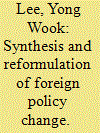

|
|
|
|
|
| Publication |
2012.
|
| Summary/Abstract |
What explains major foreign policy changes? Why and when does the state change its foreign policy? Despite the importance of foreign policy change, which can (re)shape the nature of a given state's international relations vis-à-vis other states and international systems, explanations of foreign policy change have received only sporadic attention in foreign policy analysis literature. Against this backdrop, I offer in this article a new framework designed to capture both motivational and processual aspects of foreign policy change. I develop the framework by critically examining and synthesising two recent systematic explorations of foreign policy change: one framework within the tradition of rationalism (broadly defined) - David Welch's Painful Choice: A Theory of Foreign Policy Change (2005) - and the other within constructivism - Jeffrey Legro's Rethinking the World: Great Power Strategies and International Order (2006). For the motivational analysis, I link the role of crisis-defining ideas to threat perception to sharpen prospect theory. I illustrate this reformulated synthesis with an example of Japan's policy shift toward East Asian financial regionalism.
|
|
|
|
|
|
|
|
|
|
|
|
|
|
|
|
| 10 |
ID:
117200
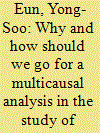

|
|
|
|
|
| Publication |
2012.
|
| Summary/Abstract |
This article argues that International Relations (IR) researchers concerned with why-questions about the state's external behaviour ought to employ a multicausal approach attentive to the interrelated relationship between external structures and internal agents, presenting the (meta-)theoretical rationales underlying its argument. Here the author suggests 'a rich/bold ontology' regarding foreign policy behaviour. Then the article elaborates on detailed and explicit guidelines on how to traverse the bridge that connects the insights of that rich ontology to the empirical research necessary to make claims about the real world of any one moment. In a related vein, the article claims that a multicausal approach should be established using what the author calls 'loose-knit deductive reasoning' through which epistemological and methodological openness can be preserved in a manageable way. More importantly, this article discusses the role of theory for IR scholarship and the standards for judging theoretical contributions and progress in the field of IR. Ultimately, the author argues that a complex and flexible approach - both as a useful mode of explanation and as a progressive model of theory construction - can make important contributions to a better understanding of foreign policy and world politics, not only because it enables researchers to become keenly sensitive to the complex reality underlying a nation's foreign policy and to the interrelated relationship between structures and agents in international relations, but also because it can serve to provide a secure base for the progressive accumulation of the evidence closely associated with multiple causation on which any adequate explanation about complex foreign policy behaviour must surely be founded and without which general theory cannot really flourish.
|
|
|
|
|
|
|
|
|
|
|
|
|
|
|
|
|
|
|
|
|